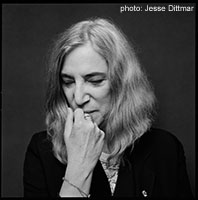All the Lost Things
Rock legend Patti Smith returns to the page with an elegiac new memoir, M Train
Since she burst onto the international punk-rock scene in 1975 with her debut album, Horses (which Rolling Stone ranks as the forty-fourth greatest rock album of all time), Patti Smith has remained a transfixing figure in American pop culture. Smith’s is a wholly American story: born into a working-class family, she reinvented herself in New York as an artist, writer, and performer. From the beginning, everything about her seemed striking and original, from her androgynous appearance (she famously claims to have copied Keith Richards’s hairstyle) to the uncanny vibrato of her voice to the unsettling leaps between tender longing and violent fury that infuse her music and her verse. Smith somehow combined an ethereal, otherworldly Romantic sensibility with the surreal nihilism of her European avant-garde heroes and created a raw, gritty, thoroughly American voice.
 Even (or perhaps especially) in her own words, Smith’s is a slippery, elusive persona. A feminist icon famous for claiming a place alongside the swaggering chauvinists of the ‘70s rock world, she married former MC5 guitarist Fred “Sonic” Smith at the height of her fame and withdrew from the public eye for nearly sixteen years, leaving New York for rural Michigan to raise their two children. She has always associated with the highest of high-art heroes, and yet her fame rests largely on three-chord rock songs. She travels the world visiting decaying cemeteries to commune with the spirits of the world’s great poets and yet unabashedly describes her eagerness to get back to her apartment or hotel room so she can binge-watch episodes of Law & Order and The Killing. Indeed, while Smith is more commonly associated with French literary figures such as Jean Genet and Arthur Rimbaud, or with Beat poets like her friend William S. Burroughs, perhaps the most apt comparison is to Walt Whitman: “Do I contradict myself?” writes Whitman in “Song of Myself.” “Very well, / then I contradict myself. I am large, I / contain multitudes.”
Even (or perhaps especially) in her own words, Smith’s is a slippery, elusive persona. A feminist icon famous for claiming a place alongside the swaggering chauvinists of the ‘70s rock world, she married former MC5 guitarist Fred “Sonic” Smith at the height of her fame and withdrew from the public eye for nearly sixteen years, leaving New York for rural Michigan to raise their two children. She has always associated with the highest of high-art heroes, and yet her fame rests largely on three-chord rock songs. She travels the world visiting decaying cemeteries to commune with the spirits of the world’s great poets and yet unabashedly describes her eagerness to get back to her apartment or hotel room so she can binge-watch episodes of Law & Order and The Killing. Indeed, while Smith is more commonly associated with French literary figures such as Jean Genet and Arthur Rimbaud, or with Beat poets like her friend William S. Burroughs, perhaps the most apt comparison is to Walt Whitman: “Do I contradict myself?” writes Whitman in “Song of Myself.” “Very well, / then I contradict myself. I am large, I / contain multitudes.”
Unlike Smith’s first memoir, Just Kids, an account of her early years in New York and her relationship with photographer Robert Mapplethorpe (whose most famous works include the iconic cover of Smith’s Horses), her new book, M Train, is less memoir than meditation: a window into the meandering imagination of a wholly committed artist who is still searching—sometimes urgently, sometimes whimsically—for the medium through which to translate her unquiet mind. Though M Train travels around the world—to New York, London, Germany, Japan, French Guiana, Mexico, the suburbs of Detroit—the book happens, really, in familiar cafes, where Smith consumes gallons of coffee, nibbles on toast or sips from a cup of soup, and scribbles out her visions and obsessions: a dream of a “cowpoke” (presumably inspired by the playwright Sam Shepard, her former lover and collaborator), Haruki Murakami’s The Wind-Up Bird Chronicle, Detective Sarah Linden from The Killing.
 “Lost things,” Smith writes. “They claw through the membranes, attempting to summon our attention through an indecipherable mayday. Words tumble in helpless disorder. The dead speak. We have forgotten how to listen.” In some regards, M Train is chiefly an effort to commune with the dead—most significantly Smith’s husband Fred, who died in 1986 from heart failure at the premature age of forty-six. “How is it that we never completely comprehend our love for someone until they’re gone?” she writes. She hauntingly evokes the ways in which the dead come back to her at the most unexpected moments—for instance, on a transatlantic flight while she’s watching a film adaptation of Patrick O’Brian’s Master & Commander, starring Russell Crowe: “Captain Jack Aubrey reminded me so much of Fred that I watched it twice. Midflight I began to weep. Just come back, I was thinking. You’ve been gone long enough. Just come back. I will stop traveling; I will wash your clothes.”
“Lost things,” Smith writes. “They claw through the membranes, attempting to summon our attention through an indecipherable mayday. Words tumble in helpless disorder. The dead speak. We have forgotten how to listen.” In some regards, M Train is chiefly an effort to commune with the dead—most significantly Smith’s husband Fred, who died in 1986 from heart failure at the premature age of forty-six. “How is it that we never completely comprehend our love for someone until they’re gone?” she writes. She hauntingly evokes the ways in which the dead come back to her at the most unexpected moments—for instance, on a transatlantic flight while she’s watching a film adaptation of Patrick O’Brian’s Master & Commander, starring Russell Crowe: “Captain Jack Aubrey reminded me so much of Fred that I watched it twice. Midflight I began to weep. Just come back, I was thinking. You’ve been gone long enough. Just come back. I will stop traveling; I will wash your clothes.”
To call M Train an elegy, however, understates its wandering elegance, or the purity and unvarnished honesty of Smith’s singular sense of artistic self-awareness. “Personally, I’m not much for symbolism,” she writes. “I never get it. Why can’t things be just as they are?” At the graveside of Bertolt Brecht, reflecting on his anti-fascist drama Mother Courage: “My mother was real and her son was real. When he died she buried him. Now she is dead. Mother Courage and her children, my mother and her son. They are all stories now.” Of a curious plot device in The Wind-Up Bird Chronicle: “I have always hated loose ends. Dangling phrases, unopened packages, or a character that inexplicably disappears, like a lone sheet on a clothesline before a vague storm, left to flap in the wind until that same wind carries it away to become the skin of a ghost or a child’s tent.”
For a book with no clear narrative structure or chronology, M Train is surprisingly compelling and accessible. Smith comes off not as a solitary demiurge but as a woman eager to befriend and be befriended. She may be rock ‘n’ roll royalty, at home in the company of literary and music gods alike, but she’s also a person who takes a genuine interest in the guy who pours her coffee at the café she frequents near her apartment in lower Manhattan. Hence, reading M Train often feels like spending a few ruminative hours with an ordinary widow who, despite the many fulfillments of a rich life, still struggles with loneliness and a longing for the past: “We want things we cannot have, we seek to reclaim a certain moment, sound, sensation. I want to hear my mother’s voice. I want to see my children as children. Hands small, feet swift. Everything changes. Boy grown, father dead, daughter taller than me, weeping from a bad dream. Please stay forever, I say to the things I know. Don’t go. Don’t grow.” Smith may be obsessed with the luminaries of art and literature, but her heart is firmly in the everyday, drawing art out of the most universal emotions and experiences.

Ed Tarkington holds a B.A. from Furman University, an M.A. from the University of Virginia, and a Ph.D. from the creative-writing program at Florida State University. His debut novel, Only Love Can Break Your Heart, will be published by Algonquin Books in January 2016. He lives in Nashville.

